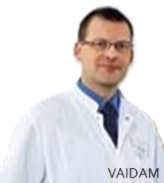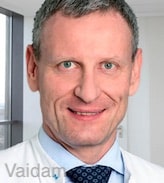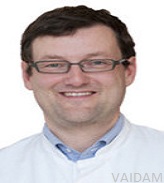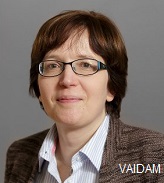Transarterial chemoembolization or TACE Chemotherapy uses anti-cancer (cytotoxic) drugs to destroy cancer cells. This process is used to treat liver cancer but may also be used in patients whose cancer has spread to other areas of the body. It may be used as a standalone treatment or combined with surgery, ablation, chemotherapy, or radiation therapy depending on the number and type of cancers. Cancers that may be treated by TACE are:
You may be given a medication called Allopurinol, which may help protect the kidneys from the chemotherapy and the byproducts produced by the dying tumor cells.
The patient can feel a slight pinch when the nurse or technologist inserts a needle into their vein for the IV line to inject the local anesthetic.
The patient can leave the hospital within 48 hours after the procedure and resume their activities within a week.
In this procedure, x-ray equipment, a catheter, and embolic agents are used. The procedure is usually completed within 90 minutes.
The cost of Transarterial Chemoembolization includes:
The overall cost of the procedure also varies based on the patient's condition and preferences. Some of these factors are:
This procedure is performed by a highly-trained interventional radiologist.
Listing popular specialists:

Chairman, 32 years of experience

Bile Duct Cancer Treatment Bladder Cancer Treatment Cervical Cancer Treatment Breast Cancer-Surgical Acute Lymphocytic Leukemia - ALL in Adults Breast Biopsy Hairy Cell Leukemia - HCL Metastatic Tumors Treatment Adrenal Cancer Treatment Anal Cancer Treatment Cancer in Children Carcinoma of Unknown Primary (CUP) Treatment Endometrial Cancer Treatment

Chairman, 25 years of experience

Radiosurgery and Stereotactic Radiation Therapy Tomotherapy Intraoperative Radiation Therapy Endometrial Cancer Treatment Esophagus Cancer Treatment Ewing Family of Tumors Treatment Eye Cancer Treatment Gallbladder Cancer Treatment

Director, 30 years of experience

VMAT (volumetrically modulated arc therapy) IMRT (Intensity Modulated Radiotherapy Stereotactic CyberKnife Novalis Tomotherapy Gating Image-guided irradiation Brachytherapy Hyperthermia IORT (intraoperative radiotherapy) Total body irradiation Total skin irradiation Proton therapy in eye tumors Drug tumor therapy Palliative Medicine Psycho-oncology

Chairman, 32 years of experience

Image-Guided Radiotherapy (IGRT), Head and Neck Cancer, Brain Tumours GI & Hepato-biliary Magnetic resonance imaging

Prof. Dr. Med. Robert Krempien
Chief, 25 years of experience

Diagnosis and treatment of breast cancer, Intravasal radiation therapy in the thigh and pelvic region, Radiation therapy of benign, Degenerative and inflammatory diseases, Endocrine orbitopathies

Director, 41 years of experience

Image-Guided Radiotherapy (IGRT), Head and Neck Cancer, Brain Tumours GI & Hepato-biliary Magnetic resonance imaging Brain tumors Head and neck tumors Lung cancer Gynecological cancer Breast cancer Prostate cancer Soft tissue sarcomas Simultaneous radiotherapy and systemic treatment in the different cancer types

Director, 17 years of experience

Image-Guided Radiotherapy (IGRT), Head and Neck Cancer, Brain Tumours GI & Hepato-biliary Magnetic resonance imaging Stereotactic Radiation Intensity-modulated radiotherapy (IMRT) Volumetric-modulated arc therapy (VMAT)

Director, 26 years of experience

Esophageal Cancer Larynx Cancer Breast Cancer Lung Cancer Ovarian Cancer

Chief, 31 years of experience

High precision radiation therapy IMRT Stereotaxic Radiosurgery Combined radio-chemotherapy Intraoperative radiotherapy (IORT) Carcinoma of Unknown Primary (CUP) Treatment Endometrial Cancer Treatment

Chief, 27 years of experience

Ionising radiation Chemotherapy Apoptosis Cancer research Cancer biology Oncology

Senior Consultant, 17 years of experience

Image-guided radiation therapy, Stereotactic radiation therapy, Intensity modulated radiation therapy

Prof. Dr. med. Mechthild Krause
Consultant, 12 years of experience

Brain tumor, Breast tumor
Patients can see improvement in the liver depending on the type of liver cancer. This procedure can improve the quality of life.
CT or MRI will be performed every three months after the procedure to determine how much the tumors shrink and to see if any new tumors arise in the liver.
Our Services for Transarterial Chemoembolization Tace in Germany
Transparent - Professional - Without Hassles






NABH Certified Healthcare Discovery Platform
Vaidam is NABH certified healthcare discovery platform that will connect you to top-notch medical experts, hospitals, wellness options, and trusted travel partners to help identify and make the right healthcare choices.

Researched & Personalized Treatment Plan - Under One Roof
You can search for the best hospitals, read about them, view photographs of the facilities at the hospitals and the places at which the hospitals are located, and check the cost of treatment.

Quality Treatment Within Your Budget
As soon as you post an enquiry, the patient relation team will collect details from you, share them with the doctors and hospitals on Vaidam's panel, and get a personalized treatment plan. We research to get quality treatment within your budget.

Treatment to Travel
Vaidam concierge assists patients, to get medical Visa, the best airline fares and arrangements for your stay. Our concierge also helps you with daily travel, language, and food concerns. Vaidam does everything to be your perfect host. All of Vaidam’s services are free of cost to patients.

International Reach
Vaidam Health has network in 15+ countries, which includes India, Turkey, UAE, Germany, South Korea, Thailand, Malaysia, Spain.
Note: Vaidam Health does not provide medical advice, diagnosis or treatment. The services and information offered on www.vaidam.com are intended solely for informational purposes and cannot replace the professional consultation or treatment by a physician. Vaidam Health discourages copying, cloning of its webpages and its content and it will follow the legal procedures to protect its intellectual property